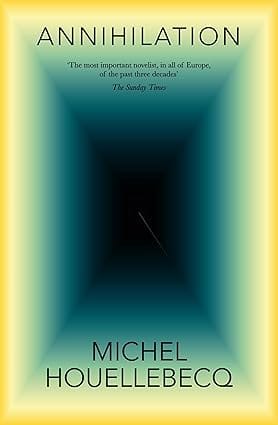WELCOME TO MIDLAND BOOK SHOP!
SHOP FOR
- Contemporary Fiction
- Contemporary Fiction
- Children
- Children
- Comics & Graphic Novels
- Comics & Graphic Novels
- Non-Fiction
- Non-Fiction
- Fiction
- Fiction
Shop No.20, Aurobindo Palace Market, Hauz Khas, Near Church +91 9818282497 | 011 26867121 110016 New Delhi IN
Midland The Book Shop ™
Shop No.20, Aurobindo Palace Market, Hauz Khas, Near Church +91 9818282497 | 011 26867121 New Delhi, IN
+919871604786 https://www.midlandbookshop.com/s/607fe93d7eafcac1f2c73ea4/6468e33c3c35585403eee048/without-tag-line-480x480.png" [email protected]9781035026401 6710ffc755ac8a002b623bac Annihilation https://www.midlandbookshop.com/s/607fe93d7eafcac1f2c73ea4/6710ffc855ac8a002b623bb4/71tcrgmj2ol-_sy425_.jpg 9781035026401
It is 2027. France is in a state of economic decline and moral decay. Unemployment, rural poverty and income inequality have reached unprecedented levels. As the country plunges into a closely-fought presidential campaign, the French state falls victim to a series of mysterious and unsettling cyberattacks. The sophisticated nature of the attacks leaves the best computer scientists of the DGSI – the French counter-terrorism and counter-intelligence agency - scrambling for answers. A video posted on the internet depicts the guillotining of Finance Minister Bruno Juge. The atmosphere surrounding the elections, already tense, heightens further… As an adviser to and confidant of Minister Juge, Paul Raison is close to the heart of government. His wife Prudence is a Treasury official, while his father Édouard, now retired, has spent his career working for the DGSI. And the personal life of Raison fils is as troubled and as atomised as that of the nation – his marriage has become strained, while his ties with his siblings are distant. But when Édouard has a stroke, his children - Cécile, a fervent Catholic; Aurélien, a sensitive artist; and Paul, the government bureaucrat – have an opportunity to repair their relationships, as they determine to free their father, who is in a coma, from the medical centre where he is wasting away. And then Paul himself is struck down by illness… Enfant terrible and provocateur, Michel Houellebecq’s latest novel reveals both a new level of ambition and new sides to his writing, as he addresses faith and family, love and mortality, and adds compassion and tenderness to the emotions of rage, disgust and irony that have powered his earlier novels – and he himself – to international fame.
Review
The most interesting novelist of our times - Evening Standard
Michel Houellebecq’s new book proves he is one of the world’s greatest novelists . . . He writes superbly . . . In England . . . we have no one, male or female, to match Houellebecq - The Daily Telegraph
Surely the most important novelist to have been publishing not only in France but in all of Europe over the past three decades. -- David Sexton, The Sunday Times
A compassionate, deeply affecting novel about love and death and the way we treat the dying . . . worthy of Balzac . . . telling truths that come straight from Pascal. We can only hope that it is not Houellebecq's swansong, after all - The Spectator
An extended meditation on human frailty and the lack of spirituality in the Western world . . . Houellebecq displays compassion and empathy, and a belief in the redemptive power of love. - The New Statesman
Annihilation leans neither towards hope nor despair, but towards a transcendent serenity – an eerie peace that arises, as everything arises in this novel, in the space to which warring forces give shape - The Guardian
Since the start of his literary career, Michel Houellebecq has been viewed in France as a prodigy whom his read
Michel Houellebecq’s new book proves he is one of the world’s greatest novelists . . . He writes superbly . . . In England . . . we have no one, male or female, to match Houellebecq - The Daily Telegraph
Surely the most important novelist to have been publishing not only in France but in all of Europe over the past three decades. -- David Sexton, The Sunday Times
A compassionate, deeply affecting novel about love and death and the way we treat the dying . . . worthy of Balzac . . . telling truths that come straight from Pascal. We can only hope that it is not Houellebecq's swansong, after all - The Spectator
An extended meditation on human frailty and the lack of spirituality in the Western world . . . Houellebecq displays compassion and empathy, and a belief in the redemptive power of love. - The New Statesman
Annihilation leans neither towards hope nor despair, but towards a transcendent serenity – an eerie peace that arises, as everything arises in this novel, in the space to which warring forces give shape - The Guardian
Since the start of his literary career, Michel Houellebecq has been viewed in France as a prodigy whom his read
in stockINR 719
1 1
Email ID already exists!
Your Current password is incorrect
Password Updated Successfully
Thanks for your Feedback
- Home
- Crime Thriller & Mystery Books
- Annihilation
Annihilation
ISBN: 9781035026401
₹719
₹899 (20% OFF)SIZE GUIDE
Sold By: Hauz Khas - Aurobindo Market
Details
- ISBN: 9781035026401
- Author: Michel Houellebecq
- Publisher: Picador
- Pages: 544
- Format: Paperback
Book Description
It is 2027. France is in a state of economic decline and moral decay. Unemployment, rural poverty and income inequality have reached unprecedented levels. As the country plunges into a closely-fought presidential campaign, the French state falls victim to a series of mysterious and unsettling cyberattacks. The sophisticated nature of the attacks leaves the best computer scientists of the DGSI – the French counter-terrorism and counter-intelligence agency - scrambling for answers. A video posted on the internet depicts the guillotining of Finance Minister Bruno Juge. The atmosphere surrounding the elections, already tense, heightens further… As an adviser to and confidant of Minister Juge, Paul Raison is close to the heart of government. His wife Prudence is a Treasury official, while his father Édouard, now retired, has spent his career working for the DGSI. And the personal life of Raison fils is as troubled and as atomised as that of the nation – his marriage has become strained, while his ties with his siblings are distant. But when Édouard has a stroke, his children - Cécile, a fervent Catholic; Aurélien, a sensitive artist; and Paul, the government bureaucrat – have an opportunity to repair their relationships, as they determine to free their father, who is in a coma, from the medical centre where he is wasting away. And then Paul himself is struck down by illness… Enfant terrible and provocateur, Michel Houellebecq’s latest novel reveals both a new level of ambition and new sides to his writing, as he addresses faith and family, love and mortality, and adds compassion and tenderness to the emotions of rage, disgust and irony that have powered his earlier novels – and he himself – to international fame.
Review
The most interesting novelist of our times - Evening Standard
Michel Houellebecq’s new book proves he is one of the world’s greatest novelists . . . He writes superbly . . . In England . . . we have no one, male or female, to match Houellebecq - The Daily Telegraph
Surely the most important novelist to have been publishing not only in France but in all of Europe over the past three decades. -- David Sexton, The Sunday Times
A compassionate, deeply affecting novel about love and death and the way we treat the dying . . . worthy of Balzac . . . telling truths that come straight from Pascal. We can only hope that it is not Houellebecq's swansong, after all - The Spectator
An extended meditation on human frailty and the lack of spirituality in the Western world . . . Houellebecq displays compassion and empathy, and a belief in the redemptive power of love. - The New Statesman
Annihilation leans neither towards hope nor despair, but towards a transcendent serenity – an eerie peace that arises, as everything arises in this novel, in the space to which warring forces give shape - The Guardian
Since the start of his literary career, Michel Houellebecq has been viewed in France as a prodigy whom his read
Michel Houellebecq’s new book proves he is one of the world’s greatest novelists . . . He writes superbly . . . In England . . . we have no one, male or female, to match Houellebecq - The Daily Telegraph
Surely the most important novelist to have been publishing not only in France but in all of Europe over the past three decades. -- David Sexton, The Sunday Times
A compassionate, deeply affecting novel about love and death and the way we treat the dying . . . worthy of Balzac . . . telling truths that come straight from Pascal. We can only hope that it is not Houellebecq's swansong, after all - The Spectator
An extended meditation on human frailty and the lack of spirituality in the Western world . . . Houellebecq displays compassion and empathy, and a belief in the redemptive power of love. - The New Statesman
Annihilation leans neither towards hope nor despair, but towards a transcendent serenity – an eerie peace that arises, as everything arises in this novel, in the space to which warring forces give shape - The Guardian
Since the start of his literary career, Michel Houellebecq has been viewed in France as a prodigy whom his read
User reviews
NEWSLETTER
Subscribe to get Email Updates!
Thanks for subscribing.
Your response has been recorded.

India's Iconic & Independent Book Store offering a vast selection of books across a variety of genres Since 1978.
"We Believe In The Power of Books" Our mission is to make books accessible to everyone, and to cultivate a culture of reading and learning. We strive to provide a wide range of books, from classic literature, sci-fi and fantasy, to graphic novels, biographies and self-help books, so that everyone can find something to read.
Whether you’re looking for your next great read, a gift for someone special, or just browsing, Midland is here to make your book-buying experience easy and enjoyable.
We are shipping pan India and across the world.
For Bulk Order / Corporate Gifting
 +91 9818282497 |
+91 9818282497 |  [email protected]
[email protected]
Click To Know More
INFORMATION
ACCOUNT
QUICK LINKS
ADDRESS
Midland Book Shop - Hauz Khas
Shop No.20, Aurobindo Palace Market, Near Church, New Delhi
Shop No.20, Aurobindo Palace Market, Near Church, New Delhi














